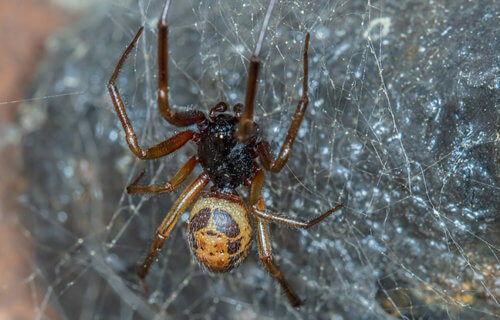GALWAY, Ireland — Just when you thought nothing could possibly make 2020 any worse, researchers in Ireland have bad news for people terrified of spiders. A new study reveals that certain arachnids actually carry something far worse than venom in their fangs — antibiotic-resistant bacteria.
A team from the National University of Ireland-Galway has confirmed that some common house spiders carry harmful bacteria within their bodies. These toxins can pass through a bite and infect people who have an unfortunate run-in with these crawlers. In the case of Noble False Widow spiders, their bacteria strains appear to be resistant to many common antibiotics.
“About 10 species of spiders common in North-western Europe have fangs strong enough to pierce human skin and deliver venom, but only one of them, the recent invasive noble false widow spider, is considered of medical importance. Most of the time, a spider bite results in some redness and pain,” Galway zoologist Dr. John Dunbar says in a university release.
“In some cases, however, victims seem to develop long lasting infections for which strong antibiotic treatment – and sometimes a hospital stay – are necessary. It is this increasing range expansion and massive rise in dense populations of false widow spiders around urbanized areas across Ireland and Britain that has seen a rise in bites with some severe envenomation symptoms but also infections, which in some cases proved even difficult to treat with antibiotics.”
‘Spiders not just venomous, but also carriers of dangerous bacteria’
Study authors say their report backs up their theory that more is going on with patients dealing with complications from spider bites in recent years. While the Australian Black Widow is infamous for its potentially deadly venom, researchers say reports about “skin-eating” infections from harmless European and U.S. spider bites have been more confusing.
Until now, these serious infections have been thought to be caused by patients scratching their bite marks with unclean fingers. The new findings contend that some of these incidents really are the spider’s fault, as it passes on harmful strains of germs which damage human tissue.
“The diversity of microbes never ceases to amaze me. The power to survive and thrive in every environment is shown here by the presence of antimicrobial resistance bacteria even in spider venom. Antimicrobial resistance (AMR) is an urgent and growing problem worldwide,” senior study author Dr. Aoife Boyd says.
“Our study demonstrates that spiders are not just venomous but are also carriers of dangerous bacteria capable of producing severe infections. The biggest threat is that some of these bacteria are multi-drug resistant, making them particularly difficult to treat with regular medicine. This is something that health care professionals should consider from now on,” study co-lead author Neyaz Kahn adds.
Researchers say many varieties of spiders do have venom with antibacterial properties too. They add it is still up for debate whether this trait may actually neutralize bacteria at the bite site.
The study appears in the journal Scientific Reports.
